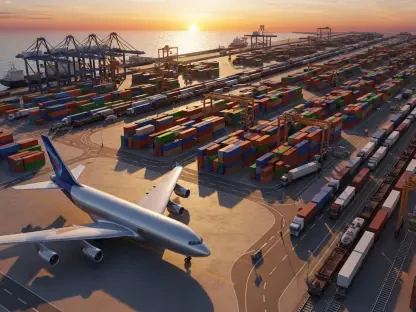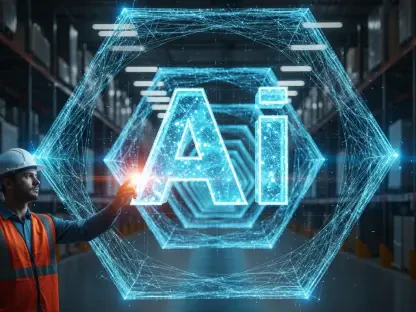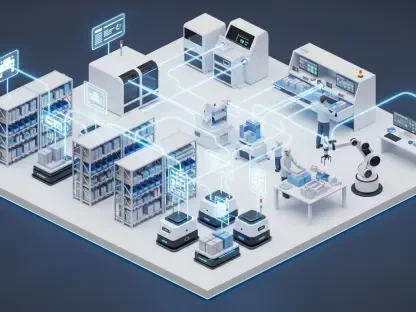As the pace of global commerce accelerates, ensuring that the final leg of the delivery process—commonly known as last-mile delivery—is both efficient and timely has become a critical focus for supply chain logistics. The constant push to meet ever-increasing customer expectations, especially for rapid delivery times, makes last-mile delivery one of the most complex and costly aspects of the logistics process. Integrating artificial intelligence (AI) into this crucial phase offers new avenues to streamline operations, enhance customer satisfaction, and reduce overall costs. This article delves into the myriad ways AI is shaping the future of last-mile delivery.
Bridging the Gap Between Decision-Makers and Operations
One of the perennial challenges in the supply chain logistics realm is the disconnect between C-level decision-makers and the operational teams that execute day-to-day logistics processes. This gap can result in strategic misalignments and inefficient operations. AI has the potential to bridge this divide by providing real-time data and actionable insights that dovetail strategic goals with ground-level execution. By adopting AI, businesses can foster better communication and understanding, creating a more cohesive, synchronized supply chain strategy.
AI-powered tools further augment the capabilities of operational teams by automating routine tasks. This automation frees human resources to focus on more value-added activities, thereby increasing overall efficiency. This enables teams to make quicker, more informed decisions, adapting with agility to ever-changing circumstances. For example, AI can analyze data to instantly update delivery schedules in response to unexpected delays or traffic conditions, ensuring that strategic decisions are operationalized swiftly and effectively.
Enhancing Route Optimization
Traditional static routing methods, based on fixed schedules and routes, have long been inadequate for addressing the real-time variables that can impact last-mile delivery. Factors such as traffic congestion, inclement weather, and last-minute order changes can disrupt planned routes, leading to delays and increased costs. Enter AI-driven dynamic route optimization, which continuously adjusts delivery routes based on real-time data inputs. By doing so, AI ensures that deliveries are carried out in the most efficient and timely manner possible.
This technology is especially beneficial for industries where on-time delivery is critical. For example, fresh produce and perishable goods require strict adherence to delivery schedules to maintain quality. By using AI to dynamically optimize routes, companies can significantly reduce fuel consumption, lower operational costs, and improve overall delivery performance. The result is not only a more efficient supply chain but also higher levels of customer satisfaction due to timely deliveries.
Tackling Load Optimization Challenges
AI’s influence extends well beyond just route optimization; it plays a pivotal role in refining load optimization within warehouses and distribution centers. Traditional load optimization software tends to focus on downstream processes, often falling short in its responsiveness to dynamic market conditions. On the other hand, AI-powered solutions enable upstream optimization, allowing for last-minute order changes and real-time adjustments that align with current demand or supply chain disruptions.
In sectors such as grocery, where temperature control during transport is paramount, AI can fine-tune load configurations to ensure both product quality and regulatory compliance. These AI-driven systems can strategically orchestrate trailer loading processes, minimizing manual adjustments and maintaining the integrity of temperature-sensitive perishables. For example, AI can dynamically allocate space in trucks based on temperature zones, ensuring that each product remains within its required temperature range throughout transit.
Improving Data Quality and Integration
The efficacy of AI and machine learning algorithms largely hinges on the quality of the data they analyze. Unfortunately, many companies grapple with data silos, inconsistent formats, and outdated information, all of which can hinder the effectiveness of AI solutions. AI can dramatically improve data quality by integrating data from various sources, thereby ensuring consistency and accuracy. By breaking down these data silos, AI enables a more holistic view of the supply chain, improving transparency and decision-making processes.
Enhanced data quality allows AI to generate more meaningful insights and recommendations. This can lead to improved inventory management, more accurate demand forecasting, and overall supply chain optimization. For example, AI can analyze patterns to predict which products are likely to experience higher demand during certain periods, allowing companies to plan their inventories more effectively. In turn, this leads to more efficient operations and better service levels for customers.
Adapting to Real-Time Market Conditions
In the fast-paced world of global commerce, the ability to adapt quickly to real-time market conditions is crucial for maintaining a competitive edge. AI-powered tools provide the agility needed to respond to sudden changes in demand, supply chain disruptions, and unforeseen events like natural disasters. This flexibility ensures that companies can maintain high service levels and customer satisfaction, even in the face of challenges.
For instance, AI-driven predictive analytics can help companies anticipate market trends and adjust their strategies proactively. By analyzing historical data and market indicators, AI can forecast demand spikes or supply shortages, allowing companies to either ramp up production or secure additional inventory ahead of time. This forward-thinking approach not only helps businesses stay ahead of the competition but also positions them to capitalize on emerging opportunities, thereby driving long-term success.
Leveraging AI for Customer Service Excellence
Customer service remains a cornerstone of effective last-mile delivery. AI can significantly enhance customer interactions by providing personalized experiences and proactive communication. For instance, AI-driven chatbots can handle routine inquiries, offering instant responses while freeing up human customer service agents to tackle more complex issues. This not only improves efficiency but also elevates the overall customer experience by ensuring quicker response times.
Moreover, AI can analyze customer behavior and preferences to offer tailored services, fostering greater customer loyalty. By identifying patterns in customer data, AI can help companies anticipate needs and deliver personalized recommendations. This level of customization not only enhances the customer experience but also encourages repeat business. For example, by notifying customers of delivery status changes or delays through real-time updates, AI ensures transparency and builds trust.
Strategic Implementation of AI Solutions
To maximize the benefits of AI, companies need a clear, coherent strategy that aligns with their broader business objectives. This strategic implementation involves bridging the gap between C-level executives and operational teams to ensure everyone is working towards the same goals. Continuous process refinement and improvement are essential components of this strategy, helping businesses to adapt and evolve their AI applications over time.
Combining AI-driven insights with human expertise allows companies to make better-informed decisions, balancing cost savings with service quality. Strategic adjustments, such as optimizing delivery frequencies based on detailed cost-benefit analyses, can lead to significant efficiency gains. For example, reducing the number of weekly deliveries while maintaining product quality can result in substantial transportation cost savings without compromising customer satisfaction.
Future Prospects and Continuous Innovation
Global commerce continues to quicken its pace, and the final stretch of the delivery process, known as last-mile delivery, has become a focal point in supply chain logistics. This phase is crucial for ensuring packages arrive efficiently and on time at their final destinations. The ever-growing demand for faster delivery has made last-mile delivery one of the most intricate and expensive parts of logistics. To address these challenges, integrating artificial intelligence (AI) into last-mile delivery processes presents new opportunities. AI can streamline operations, boost customer satisfaction, and cut overall costs. From route optimization and predictive analytics to smart warehousing and automated delivery vehicles, AI is paving the way for a more effective and cost-efficient delivery system, ultimately transforming the future landscape of logistics and enhancing the customer experience.









